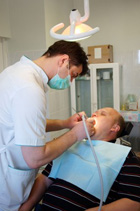 There are many good reasons to go and see your dentist every six months. If you have been recently then you will know about how they administer scaling and polishing to get rid of troublesome tartar and that they look out for signs of dental decay, oral cancer and sleep apnea. But your dentist is also keeping a close eye on the state of your gums. And thank goodness they are because gum disease actually causes more cases of tooth loss than decaying teeth themselves.
There are many good reasons to go and see your dentist every six months. If you have been recently then you will know about how they administer scaling and polishing to get rid of troublesome tartar and that they look out for signs of dental decay, oral cancer and sleep apnea. But your dentist is also keeping a close eye on the state of your gums. And thank goodness they are because gum disease actually causes more cases of tooth loss than decaying teeth themselves.
Gum disease (clinically termed periodontal disease) is not something to be especially fearful of if you take certain simple steps with your home oral health care routine. Brushing your teeth is beneficial not just for the teeth themselves. The removal of plaque from the gum line of teeth is key in beating periodontal disease. Plaque can inflame the gums, leaving them sensitive and reddened if a condition called gingivitis occurs.
Gingivitis can progress into something much more insidious: periodontitis. This where the danger of tooth loss become palpable. If the inflammation spreads to your bones that hold your teeth firmly in place then you might undergo the extremely painful experience of losing some of your teeth.
So make sure that you are not only brushing your teeth but also flossing. If you are a smoker, think about giving up because it stymies the production of saliva which naturally combats plaque in the mouth. These simple measures, carried out in conjunction with regular visits to your City of Leeds dentist, should leave you free from the potential problems of periodontal gum disease and you won’t have to worry about tooth loss.





 Making sure that your teeth are healthy is only one part of ensuring good oral health. You should also be concerned about the state of your gums because gum disease is actually a greater cause of tooth loss than tooth decay itself. Thankfully, taking care of your gums is not a major hassle and can be achieved in several easy steps.
Making sure that your teeth are healthy is only one part of ensuring good oral health. You should also be concerned about the state of your gums because gum disease is actually a greater cause of tooth loss than tooth decay itself. Thankfully, taking care of your gums is not a major hassle and can be achieved in several easy steps. However you live your life in the city of Leeds, if you are starting to suffer from any discomfort or pain, any where in your body, it can be you have an emergency on your hands that could get worse if untreated- it’s the same with a dental emergency. It’s important to understand the nature of what the emergency is, and to be able to take control until you are able to get the proper dental treatment you require. There are certain dentists that run a 24 hours emercengy service, but they certainly won’t appreciate a call out at 3am to stick a veneer back on! Some pains may not require an instant fix, but can be treated by yourself until you get seen. Such pains can be caused by a sudden tooth loss, swelling to the mouth, pain when chewing or bleeding and discharge from the gums. A chipped tooth, loss of a filling or veneer can cause pain to the gums and/or tongue. Loses can be shawed up with gauze or gum, sharp pains can be treated with various painkillers and soothants, available from over the counter. Soreness can be soothed not only by painkillers, but also by herbal remedies that can be rubbed into affetcted areas. All these antidotes will help you until you can get to your dentist. But you should know your body and if you consider it’s a severe situation, call an ambulance- an abcess eruption can kill and if there are any signs of swelling to the face, coupled with extreme pain, immediate treatment is required.
However you live your life in the city of Leeds, if you are starting to suffer from any discomfort or pain, any where in your body, it can be you have an emergency on your hands that could get worse if untreated- it’s the same with a dental emergency. It’s important to understand the nature of what the emergency is, and to be able to take control until you are able to get the proper dental treatment you require. There are certain dentists that run a 24 hours emercengy service, but they certainly won’t appreciate a call out at 3am to stick a veneer back on! Some pains may not require an instant fix, but can be treated by yourself until you get seen. Such pains can be caused by a sudden tooth loss, swelling to the mouth, pain when chewing or bleeding and discharge from the gums. A chipped tooth, loss of a filling or veneer can cause pain to the gums and/or tongue. Loses can be shawed up with gauze or gum, sharp pains can be treated with various painkillers and soothants, available from over the counter. Soreness can be soothed not only by painkillers, but also by herbal remedies that can be rubbed into affetcted areas. All these antidotes will help you until you can get to your dentist. But you should know your body and if you consider it’s a severe situation, call an ambulance- an abcess eruption can kill and if there are any signs of swelling to the face, coupled with extreme pain, immediate treatment is required. Gum diseases are very common these days even though there are so many brands of toothpastes and toothbrushes available in the market. People tend to be very careless when it comes to oral hygiene, leading to a lot of problems affecting the gums and teeth. Another reason could be the prevalence of sugary foods like cakes, sweets and soft drinks that are easily available and commonly consumed.
Gum diseases are very common these days even though there are so many brands of toothpastes and toothbrushes available in the market. People tend to be very careless when it comes to oral hygiene, leading to a lot of problems affecting the gums and teeth. Another reason could be the prevalence of sugary foods like cakes, sweets and soft drinks that are easily available and commonly consumed. Without the necessary dental care our teeth may be at risk from a number of dental problems. This ranges from mild tooth decay and gum disease to the more serious tooth abscess and even tooth loss. The one thing common to all these forms of dental problem is the pain that accompanies them. Even a mild gum disease could be responsible for causing irritation and pain and the more serious the problem, the more likely it is to cause significant pain.
Without the necessary dental care our teeth may be at risk from a number of dental problems. This ranges from mild tooth decay and gum disease to the more serious tooth abscess and even tooth loss. The one thing common to all these forms of dental problem is the pain that accompanies them. Even a mild gum disease could be responsible for causing irritation and pain and the more serious the problem, the more likely it is to cause significant pain. Teeth can be damaged in many ways. Chips, cracks and breaks can occur as the result of sporting injury, motor vehicle accidents or from any other kind of head trauma. Broken teeth can be very painful and also expose the sensitive inside parts of the tooth to the risk of infection and disease. Teeth can also be damaged by dental decay and enamel erosion. This again leaves them vulnerable to attack from disease, which could eventually lead to tooth loss. When teeth are damaged in this way it is necessary to protect them from further injury and also to restore the cosmetic appearance.
Teeth can be damaged in many ways. Chips, cracks and breaks can occur as the result of sporting injury, motor vehicle accidents or from any other kind of head trauma. Broken teeth can be very painful and also expose the sensitive inside parts of the tooth to the risk of infection and disease. Teeth can also be damaged by dental decay and enamel erosion. This again leaves them vulnerable to attack from disease, which could eventually lead to tooth loss. When teeth are damaged in this way it is necessary to protect them from further injury and also to restore the cosmetic appearance. There is no feeling quite as clean as that of just having had your teeth cleaned by a dentist or dental hygienist. No mater how thoroughly you brush and floss at home you can never get that ‘straight from the dentist’ clean feeling. Dentists and hygienists use techniques known as scaling and polishing to clean teeth as thoroughly as possible, which while sometimes a little unpleasant, are very necessary to keep teeth healthy.
There is no feeling quite as clean as that of just having had your teeth cleaned by a dentist or dental hygienist. No mater how thoroughly you brush and floss at home you can never get that ‘straight from the dentist’ clean feeling. Dentists and hygienists use techniques known as scaling and polishing to clean teeth as thoroughly as possible, which while sometimes a little unpleasant, are very necessary to keep teeth healthy. Periodontal disease, often commonly referred to as gum disease, is seen in two degrees of severity. Milder gum disease is called gingivitis and involves a mild inflammation of the gum tissue. It is estimated that three quarters of all adults in the UK will experience some gingivitis at some point. It is usually easily remedied by improved oral hygiene and some treatment from a dentist. The other more serious form of gum disease is called periodontitis and requires much more substantial treatment. It usually stems from a failure to address or treat the milder form of the disease and can cause significant dental problems such as infections and tooth loss. In fact, periodontitis is responsible for more tooth loss in the UK than tooth decay.
Periodontal disease, often commonly referred to as gum disease, is seen in two degrees of severity. Milder gum disease is called gingivitis and involves a mild inflammation of the gum tissue. It is estimated that three quarters of all adults in the UK will experience some gingivitis at some point. It is usually easily remedied by improved oral hygiene and some treatment from a dentist. The other more serious form of gum disease is called periodontitis and requires much more substantial treatment. It usually stems from a failure to address or treat the milder form of the disease and can cause significant dental problems such as infections and tooth loss. In fact, periodontitis is responsible for more tooth loss in the UK than tooth decay. Gum disease happens when the gum tissue in the mouth becomes infected due to the presence of bacterial acid found in plaque. Plaque is allowed to build up on the teeth and gums when oral hygiene is insufficient. Initially this causes gums to become red and irritable and possibly bleed when being cleaned, but mores serious gum disease can lead to tooth loss, hospitalisation and even tissue removal during surgery.
Gum disease happens when the gum tissue in the mouth becomes infected due to the presence of bacterial acid found in plaque. Plaque is allowed to build up on the teeth and gums when oral hygiene is insufficient. Initially this causes gums to become red and irritable and possibly bleed when being cleaned, but mores serious gum disease can lead to tooth loss, hospitalisation and even tissue removal during surgery. Tooth loss occurs for a number of reasons ranging from dental trauma to old age. Whatever the cause, loosing teeth can be a very embarrassing experience that can seriously affect your self-confidence and self-esteem. Missing teeth can also make eating very difficult and can cause long-lasting damage to the gums.
Tooth loss occurs for a number of reasons ranging from dental trauma to old age. Whatever the cause, loosing teeth can be a very embarrassing experience that can seriously affect your self-confidence and self-esteem. Missing teeth can also make eating very difficult and can cause long-lasting damage to the gums.

